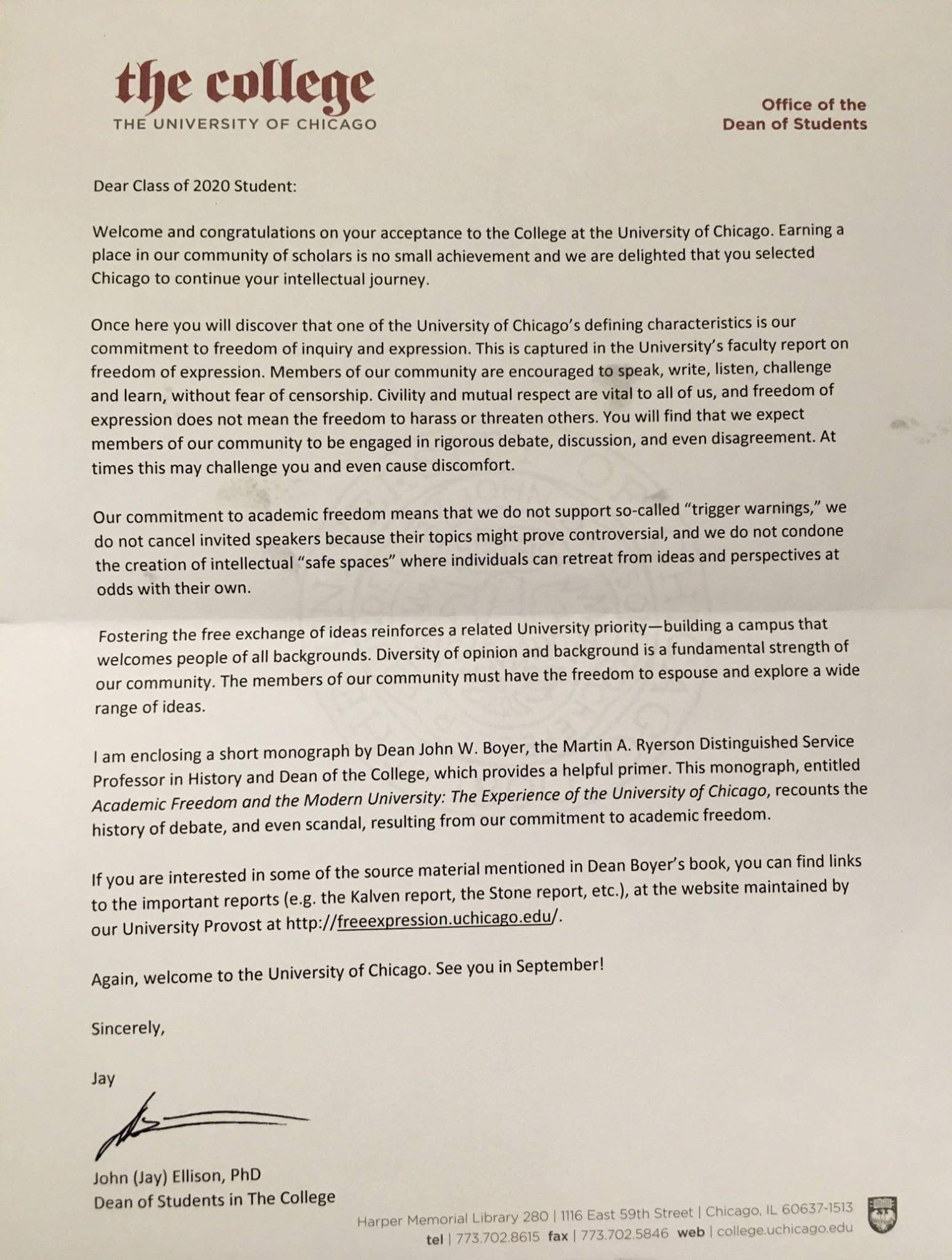Just a quick post from me this week, the first week of classes for us at OU, which has been a predictably exhilarating and exhausting experience. As schools around the country begin to come back into session, one of the big pieces of academic news this week came from a university that is still a few weeks away from starting its fall quarter. John (Jay) Ellison, the Dean of Students in the College at the University of Chicago sent a letter to incoming students in the Class of 2020
declaring the College’s opposition to “trigger warnings” and “intellectual safe spaces.” There’s a lot to be said about this letter, but I’ve been most interested in the reactions to it.
Rather than (re)characterize the letter or summarize what Ellison had to say, I might as well start by reproducing it:

What interested me about reactions among friends of mine is that nearly everyone I know seems to think that the letter is either obviously entirely sensible or obviously completely foolish. What’s fascinating is that virtually nobody I know in either camp seems to believe that a letter that is quite plainly hugely controversial ought to be controversial at all.
To lay my cards on the table a little here: I’m pretty firmly in the foolish camp; I think the letter was obviously mistaken.[1] And while the letter has, pretty predictably, gotten support from cultural warriors on the right and voices outside the academy prone to be terribly troubled by the very idea of student protestors, the people whose reactions interest me – on both sides of the issue — are all liberals or leftists. Most are academics or ex-academics. So they are, by and large, familiar with what is (and isn’t) actually going on at our nation’s colleges and universities. And I very much include myself in my observation about the absolute nature of these responses. My initial reaction against the letter was as unqualified as those I’ve encountered in favor of it. I simply could not imagine why anyone would think this letter was a good idea.
When I posted my observation about reactions to the letter on Facebook, an amazingly respectful and nuanced (particularly by the standards of social media) discussion among people on both sides ensued. So I don’t think the issue is that either side here is driven by blind ideology or raw emotion. Nor are we in a situation in which the two sides are somehow epistemologically or ethically incommensurable. Indeed, what’s striking to me is that – at least among academics on the very broad left – those on both sides of this debate seem to be concerned about a set of shared values: academic freedom, free speech, and the creation of what might be called a democratic university.
All of which makes the diametrically opposite responses to the letter all the more interesting.
_______________________________________
[1] I’m not going to spend much time explaining why I’m in the anti camp, since that’s not my focus in this post, but here are a couple
responses to the letter that I found particularly on the mark. It’s especially worth noting, as a number of people have, that one of the ironies of the letter is that the University of Chicago, one of the nation’s most aggressively policed college campuses, and the bubble of Hyde Park in which it’s located, are themselves one large, very carefully engineered safe-space.

3 Thoughts on this Post
S-USIH Comment Policy
We ask that those who participate in the discussions generated in the Comments section do so with the same decorum as they would in any other academic setting or context. Since the USIH bloggers write under our real names, we would prefer that our commenters also identify themselves by their real name. As our primary goal is to stimulate and engage in fruitful and productive discussion, ad hominem attacks (personal or professional), unnecessary insults, and/or mean-spiritedness have no place in the USIH Blog’s Comments section. Therefore, we reserve the right to remove any comments that contain any of the above and/or are not intended to further the discussion of the topic of the post. We welcome suggestions for corrections to any of our posts. As the official blog of the Society of US Intellectual History, we hope to foster a diverse community of scholars and readers who engage with one another in discussions of US intellectual history, broadly understood.
I think it’s a good idea, and I know of one liberal academic who most likely does: philosophy professor Massimo Pigliucci, who’s written more than once about things like this.
It’s about time someone stood up to these students. The message is grow up;you’re in college
I had already put my syllabus together by the time this chest-thumping letter from Chicago’s Dean of Students started making the rounds. I prefer to think of the classroom as a place where the lamp of learning shines with enough warmth and clarity to pour light out through the windows into a world that needs it. This dean apparently prefers to think of the classroom as a place where we are supposed to shine a blinding light right in students’ faces and then bark at them if they blink in the glare. What a dour
defensevision of humanism.